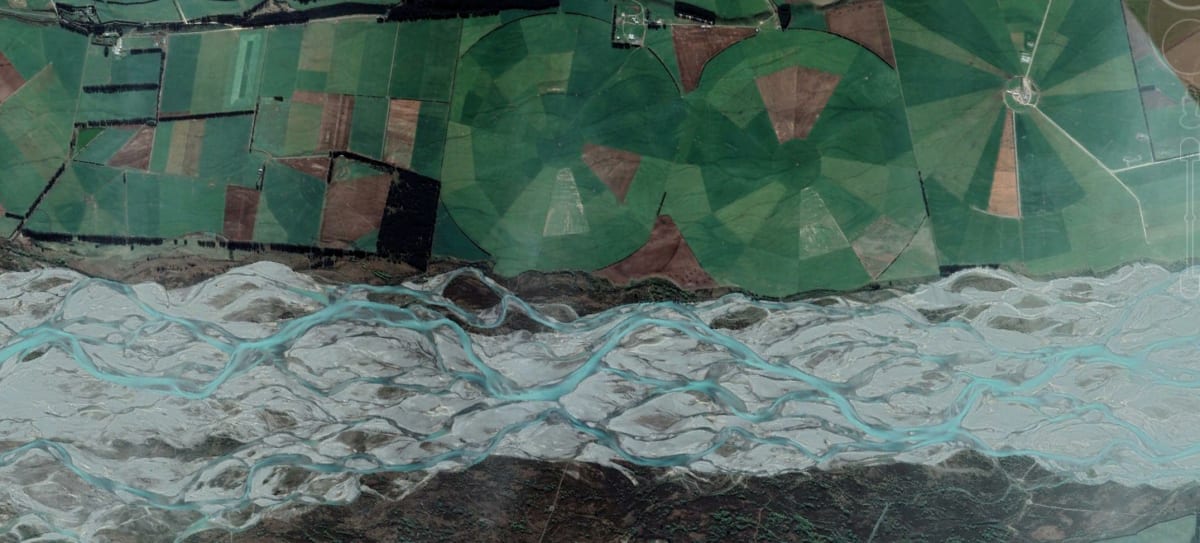
Canterbury’s regional council said a damning report was nearing release then circulated a sanitised version. David Williams reports
On August 4 last year, Trustpower and Canterbury’s regional council met in Christchurch to discuss water.
The meeting, held in the Wharekotuia Room of the council’s Tuam St offices, had been months in planning; delayed by various things, including flooding and schedule clashes.
Staffers from the council, ECan, outnumbered those from the Tauranga-headquartered, NZX-listed electricity company six to three.
The discussion centred on findings of a weighty report by a senior ECan scientist into water use on the Rakaia River – a complex issue, given the river’s nature and the overly complicated consenting regime.
ECan’s Director of Science Tim Davie outlined the purpose and high-level findings of the report – which found evidence the Rakaia’s water conservation order (WCO) was being breached and consent limits for water-takes were occasionally exceeded.
Davie mentioned the report was “nearly at release point” – a potential powder keg, given the controversial rise of irrigation in Canterbury during former Prime Minister John Key’s tenure, and his Government’s controversial sacking of ECan councillors.
“All agreed the sensitivities and need for transparency of the data,” the meeting minutes state.
It was clear from anecdotal and scientific evidence the river, particularly the lower reaches, “are suffering”, and the WCO – described as national park status for rivers – “is not achieving what it was designed to achieve”. (It’s not clear from the minutes, released to Newsroom after an official information request, who from ECan said this.)
Changes in the catchment and the way water was being managed was blamed for “unexpected effects”. But ECan was clear: more water was being diverted from the Wilberforce River into Lake Coleridge – where Trustpower stores water for its hydroelectricity station and farm irrigators – than before the WCO was amended in 2012/13.
How this extra water was being stored and released for irrigation – from Coleridge, down the Rakaia, to take points for companies like Central Plains Water, the South Island’s largest irrigator – “may be affecting the lower part of the river and the hāpua [coastal lagoons] in particular”.

Richard Purdon, ECan’s principal consents planner, raised an “outstanding issue” with the way Trustpower stored water. Coleridge has a narrow operating range from which water had been drawn, but the power company had implemented a “virtual warehouse” to “store” irrigation water.
The regulator stressed – as it did in 2014 – an Environment Court declaration “needs to be pursued” to ensure this accounting adheres to the WCO.
“Trustpower remains of the view that this is not necessary,” the minutes state. The most senior Trustpower employee in the room was environmental and regulatory service manager, Ryan Piddington.
The power company asked ECan to confirm, in writing, its “tolerance to exceedances” in water takes from the Wilberforce.
The meeting ended with a number of follow-up “actions”, including further exploring the need for a court declaration, and a request by ECan to get access to real-time water data from the lake.
And then, nothing – at least not publicly – until Newsroom published details of the original, leaked report last November.
ECan was happy to share with Trustpower aspects of the original report, which, it said, was “nearly at release point”. Remarkably, it says its intentions didn’t change.
“Finishing the project has been delayed by a number of factors,” ECan’s surface water science manager Helen Shaw says in an emailed statement.
“A senior Environment Canterbury scientist is working on obtaining the final data necessary to update the model, verify the results and conclude the report. We acknowledge this has taken significantly longer than originally intended, and this has been a cause for frustration for some.
“However, it is important that we ensure that the Rakaia Water Balance Model, the data we provide it, and the outputs it produces, are accurate and up to date. We cannot finalise a report until we have a high degree of confidence that this is the case.”
Trustpower says it is confident its operations in Canterbury comply with resource consent conditions.
Nicky Snoyink, regional conservation manager for environmental lobby group Forest & Bird, says the situation with the Rakaia report speaks volumes about the country’s “broken” environmental management system.
“Water conservation orders are meant to be the gold standard for protecting awa. That a WCO can be undermined like this without consequence is extremely concerning.
“You can make the toughest rules in the world but if they are not monitored, and if no one is monitoring the monitor, then that really is complete systemic failure. Time for some accountability.”
Before details emerged of the ECan-Trustpower meeting last August, the picture of ECan’s Rakaia report was already partially formed.
A regulator, often criticised for being a soft-touch, sat on a damning report for months, putting it through multiple internal reviews, and was loathe to publicly release the full findings.
The report’s author, senior hydrological scientist and data analyst Wilco Terink, objected stridently to sensitive sections being removed. He told bosses to remove his name from the sanitised version, on professional and ethical grounds, and subsequently resigned.
Last October, ECan sent a sanitised copy of the report to Trustpower, Central Plains Water and, because of an official information request, fishing groups. Key passages, including conclusions, were removed.
(ECan says that’s because additional work was requested by reviewers. One of those reviewers was Shaw, along with chief scientist Fiona Shanhun – the latter of whom raised concern about “several paragraphs exposing organisational risk”.)

The August 4 meeting provides important context.
It shows ECan’s top science manager, Davie, was willing to either put the report’s main findings to Trustpower directly, or have his subordinates do so in front of him.
The meeting’s minutes also confirms embarrassing sections of the Rakaia report.
ECan wanted a court declaration and Trustpower did not – and implemented the new regime anyway. The council doesn’t have access to real-time data – and had to ask if Trustpower could provide access before all data is telemetered in September this year.
To its credit, the regional council was pushing for transparency, including the possibility of a public dashboard, and said its compliance staff would follow up to ensure consent conditions were being met.
What is also clear from the meeting minutes is ECan was cognisant of “sensitivities” and didn’t intend to take immediate enforcement action. “The model indicates effects are being felt and we need to work through what this means for all parties.”
(Previously, ECan said the statute of limitations means it can take action within 12 months “of when we should have reasonably become aware an offence took place”.)
Newsroom asked ECan if subsequent work had reinforced Terink’s original findings. Shaw didn’t answer the question directly.
“We are in the process of updating the model, and will seek to verify model results with our partners, stakeholders and the community before publishing any final scientific findings.”
Talk of updating the model is interesting as the breaches were identified through data analysis.
Shaw previously told Newsroom “the Rakaia water balance report is not a compliance report”. However, it was Shaw that approved the original project plan in 2018 which said it should evaluate whether “consent holders are complying with their consents”, and “the Rakaia River is properly managed according to the WCO and consent conditions”.
“Environment Canterbury does not agree with Trustpower’s interpretation of stored water and discussions are ongoing.” – Helen Shaw
In response to Newsroom’s reporting, the Environmental Defence Society wrote to ECan warning if it won’t do its duty in following up breaches of the water conservation order, it will consider taking legal action.
(EDS had no qualms about using definitive language. Chief executive Gary Taylor said an independent legal analysis of the unpublished ECan report showed “there had been breaches”.)
Asked if it is considering an Environment Court declaration, ECan’s Shaw says: “We are considering a range of measures to improve the understanding of the WCO for all affected parties. These measures include the possibility of seeking declarations.”
She adds: “Environment Canterbury does not agree with Trustpower’s interpretation of stored water and discussions are ongoing.”
Noting Trustpower’s request for ECan to confirm, in writing, if exceedances to consented flows were tolerable – something ECan confirms are not – Newsroom asked the company if it is having to take or store more water to fulfil contracts for irrigation.
General manager of generation Stephen Fraser said in a statement: “Trustpower operates all its assets in line with their consent conditions and cooperates fully with regulators across the country to ensure compliance.”
Supplying water for “downstream use” doesn’t require an increase to water takes beyond its consented take and lake range, he said, and the water supplied is also used for electricity generation. “While we always aim to improve the efficiency of the use of our consented water takes, we are not currently seeking to increase any of our consented water takes in Canterbury.”
(In late October, after Newsroom sent questions about the Rakaia report, Trustpower’s Piddington, the environmental and regulatory services manager emailed ECan’s Shaw, saying how unfortunate it was a draft report got out including “assertions made on something that isn’t verified yet”.)
Regional councils, including ECan, have been excoriated for their substandard compliance, monitoring and enforcement work. In the face of criticism, all 16 regional councils participated in an independent assessment – which lasted two years; now the assessment is done by a customer research company, Sprout.
The last report, published last October, noted complaints and incidents had increased for ECan. It made heavy use of warnings (261) and abatement notices (260), while 97 infringement fines were issued. Nine prosecutions concluded, while two others were in progress. Fines totalled $355,000.
Of the more than 22,000 ECan consents, only 1314 “required monitoring” – a drop from 4410 the previous year.
Data gaps
In October last year, ECan said it would take six-to-12 months to update the Rakaia report.
Surface water science manager Shaw said additional data was received from Trustpower late in 2021 – “this is being used to undertake compliance checks”.
Correspondence released to Newsroom reveals a senior ECan compliance and monitoring officer emailed Trustpower in December asking for data to fulfil an official information request.
A lot of data was “in pieces”, the officer wrote, and while there’s a large amount of data in some cases – “others, we have a few gaps”.
What was requested (which means the regional council didn’t have it on hand) was: lake level, lake storage, water abstraction, discharges into the Rakaia River, and records of “stored water”.
Which begs the question: Other than Terink’s report, what compliance monitoring has ECan done at Lake Coleridge since the water conservation order was amended in 2013?
(In the amendment hearings, ECan told independent commissioners “a rigorous monitoring and web-based management regime based on virtual gorge flows can be developed with Trustpower”.)
Shaw said the regional council was checking it had sufficient data to review all abstraction consents from the Rakaia. “We have not yet completed the compliance assessments, but they are underway.”
The Rakaia model, when “finalised and tested”, will be used to check compliance, she said.
“If we do find sufficient evidence to conclude that any resource consents have been breached, we will take appropriate action.”
Critics seem to be arguing sufficient evidence already exists.







